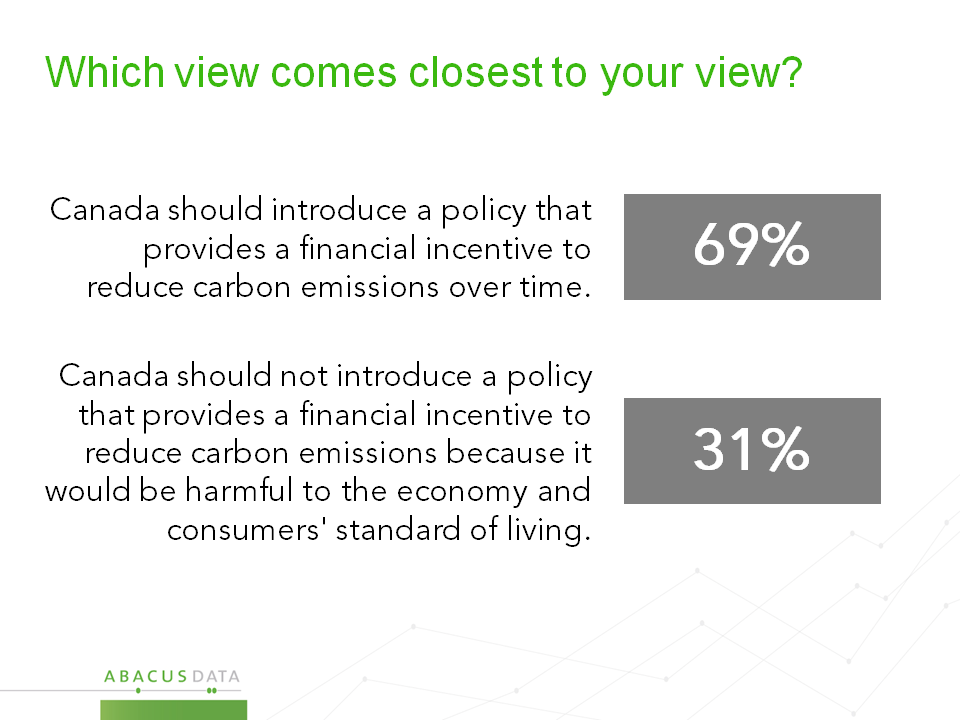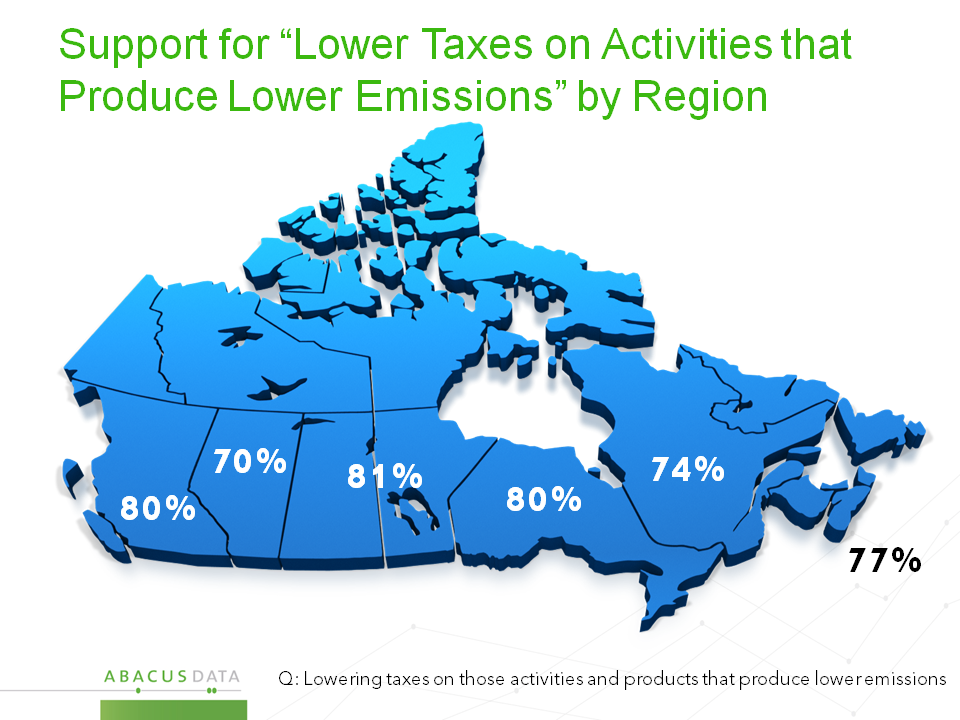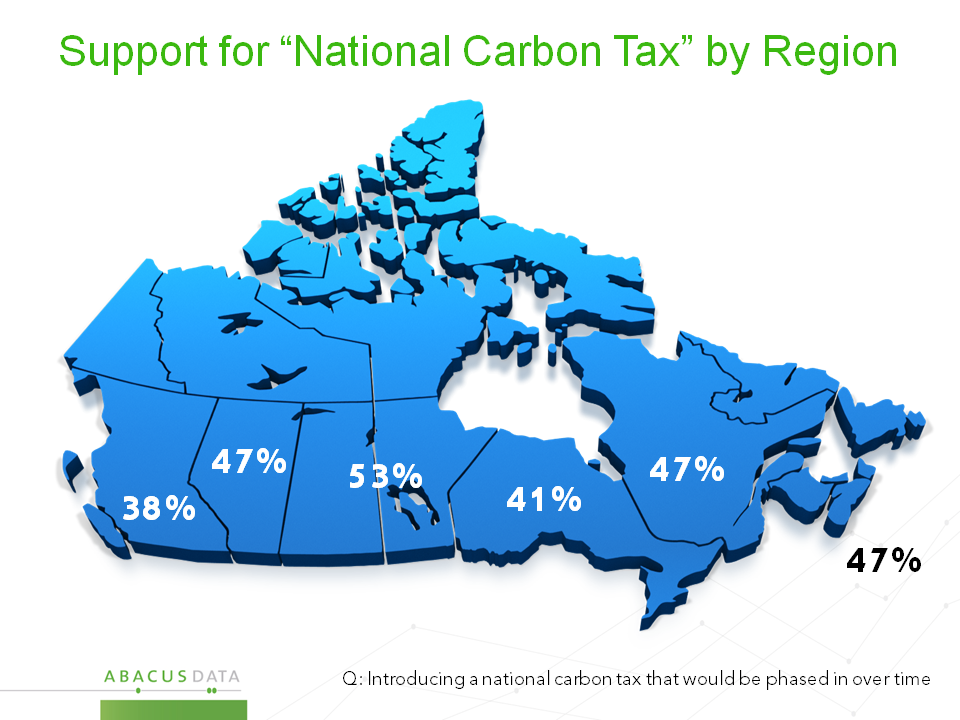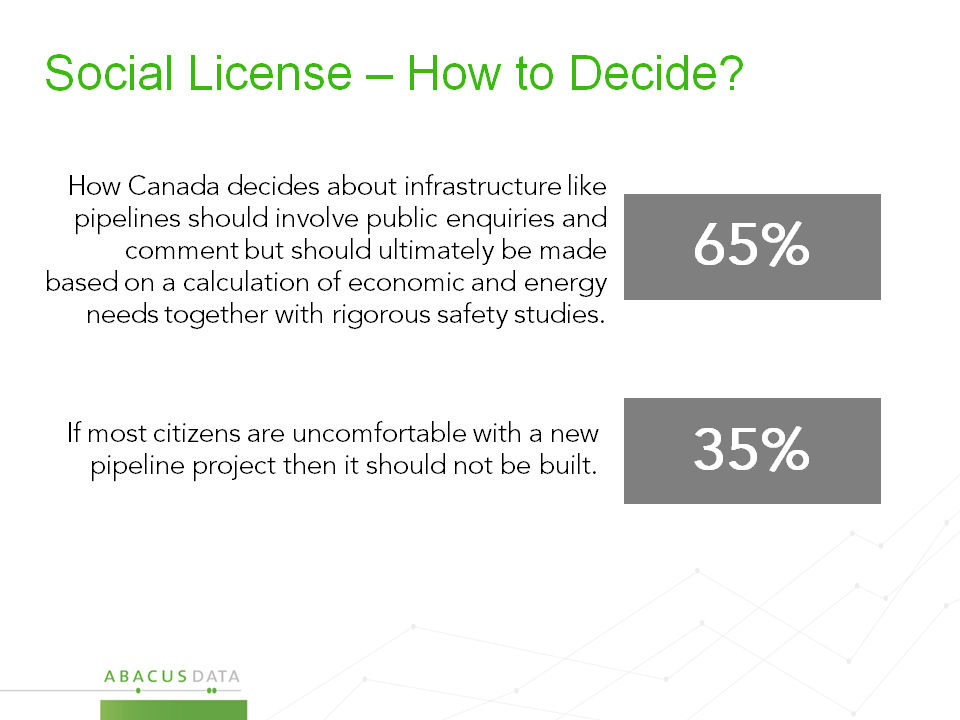Should carbon be priced? Should public opinion decide pipelines?
January 11, 2015
In our year-end public opinion poll, we asked people a handful of questions related to climate change, pricing carbon emissions, and how “social license” for new projects like pipelines should be considered.
Here’s what we found.
• When it comes to Canada’s “record on the issue of climate change” 54% of those surveyed believe “Canada can and should do more”, while 29% believe “Canada is doing as much as can be done right now” and 5% say the country is doing “more to reduce emissions than it should”. Another 12% are unsure.

• In as much as carbon pricing is a concept that is often seen as affecting Alberta more than other provinces, it is worth noting that in Alberta, 48% say Canada can and should do more. Also, among those who voted Conservative in 2011, 40% say more should be done. 58% of Liberal Party voters, and 70% of NDP voters holds view feel that way.
• Respondents were presented with two perspectives about attaching a price to carbon: “Some say Canada should introduce a policy that provides a financial incentive to reduce carbon emissions over time” or “Others oppose this idea because they feel it would be harmful to the economy and consumers’ standard of living”.
Asked which was closer to their personal view, 69% favoured a carbon reduction incentive compared to 31% who opposed the idea. Support for the idea was 64% in Alberta and 56% among those who voted Conservative in 2011.
We went on to explore how people would react to three different ways of imagining a carbon-pricing regime. These questions reveal how the form of such a policy and the manner in which it is communicated can affect the way voters react.
• Asked if they would support or oppose “increasing taxes on those activities and products that generate more emissions”. 59% support and 28% oppose. The split was 59%-28% in Alberta and 56%-36% among those who voted Conservative in 2011.
• However when asked about “lowering taxes on those activities and products that produce lower emissions” support jumps to 78%, including 82% among Conservatives and 70% in Alberta.
• Finally, “introducing a national carbon tax that would be phased in over time” finds that support drops to 44% and opposition rises to 38%. Opposition out numbers support in BC, and there is an equal split in Ontario. Among Conservative voters, only 33% support this notion, and 54% oppose it.
Finally, we wanted to touch on the question of “social license” for major projects such as pipelines. We offered two perspectives and asked people which was closer to their view.
“How Canada decides about infrastructure like pipelines should involve public inquiries and comment but should ultimately be made based on a calculation of economic and energy needs together with rigorous safety studies” or “If most citizens are uncomfortable with a new pipeline project then it should not be built”.
Two out of three (65%) say the decisions should rest on economic and scientific evaluation, rather than public opinion. The breakdowns of responses show some cleavages of opinion. Majorities of CPC (81%), LPC (68%) and NDP (56%) reject the idea of a public opinion veto, while majorities of those who support the Green Party (62%) and the BQ (62%) feel that public opinion should prevail. In Quebec, opinion is evenly split (51%-49%).
The Upshot
The results of these questions provide a good snapshot of the backdrop for some of the issues that will be topical in the coming election. Three themes emerge.
First, a significant number of people would prefer to see Canada do more to combat climate change. Far fewer are satisfied the country is doing as much as it should.
Second, if pricing carbon is to be part of a path forward, how the policy is designed and described will have a lot to do with the public reaction it will engender. The term “carbon tax” is clearly the least palatable moniker for a policy that puts a value on emissions. At the same time, describing the objective, “a financial incentive to reduce emissions” triggers 69% support. This 25-point gap shows just how much the “bumper sticker” matters, and reflects public instincts to avoid measures that sound painful in favour of those that sound more gentle.
Finally, most people reject the notion that public opinion should hold an effective veto over potentially important infrastructure projects such as pipelines. On balance most people believe that the public should be heard, and attentively so, but that public input should only be one consideration among others.
Methodology
Our survey was conducted online with 1,438 Canadians aged 18 and over from December 18 to 20, 2014. A random sample of panelists was invited to complete the survey from a large representative panel of Canadians, recruited and managed by Research Now, one of the world’s leading provider of online research samples.
The Marketing Research and Intelligence Association policy limits statements about margins of sampling error for most online surveys. The margin of error for a comparable probability-based random sample of the same size is +/- 2.6%, 19 times out of 20. The data were weighted according to census data to ensure that the sample matched Canada’s population according to age, gender, educational attainment, and region. Totals may not add up to 100 due to rounding.
In case you missed it, here are some of our recent releases:
Looks, Gender, and Ideas: Do these matter?
Political Leaders’ Choices and Voters’ Perspectives
Conservatives and Liberals end 2014 neck and neck as Harper’s personal numbers improve
About Abacus Data
We offer global research capacity with a strong focus on customer service, attention to detail and value added insight. Our team combines the experience of our Chairman Bruce Anderson, one of Canada’s leading research executives for two decades, with the energy, creativity and research expertise of CEO David Coletto, PhD.









